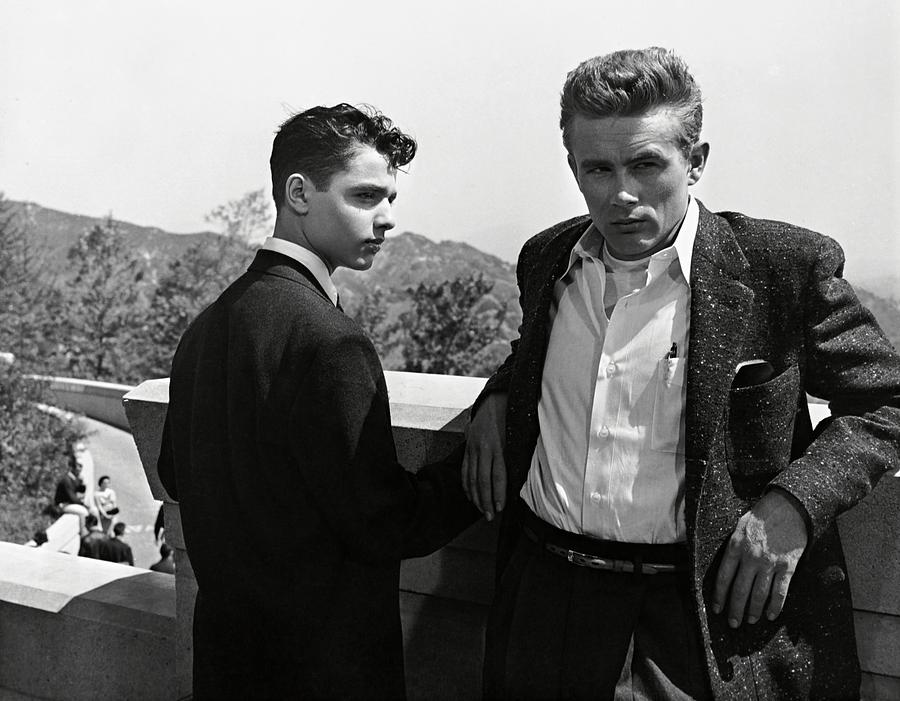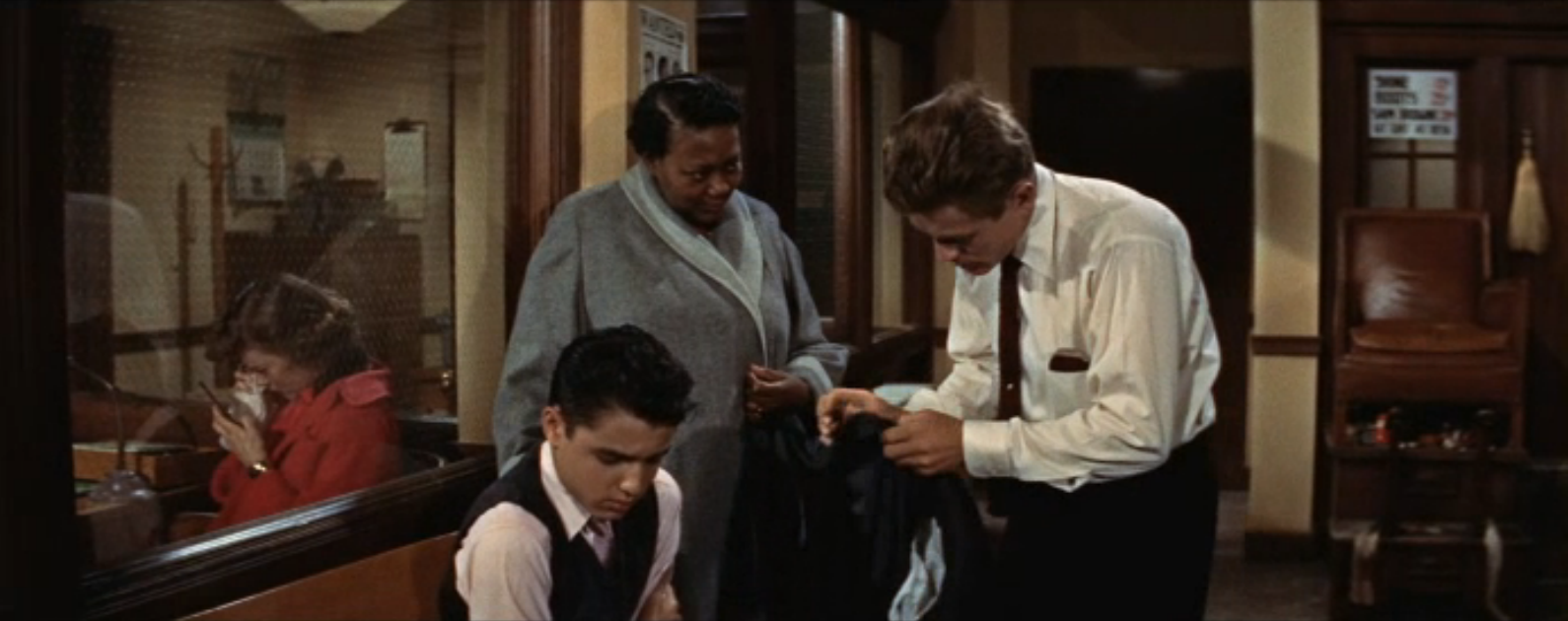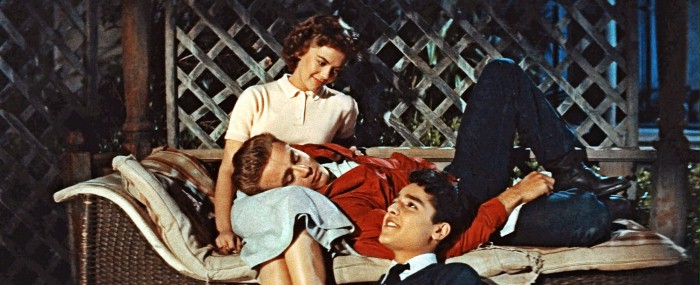a series by Christopher James looking at the 'Gay Best Friend' trope
 Sure, Plato stared at Jim that way just because he wanted to be his good friend, right?After a few months of looking at the gay best friend trope over the past 30 years, we wanted to go back to a time where the “gay best friend” couldn’t be called a “gay best friend.” The Hayes Code stopped queer life from being outwardly depicted on screen. However, that didn’t keep gay characters off the screen. Screenwriters, directors and actors would “code” certain characters as queer. This allows them to pass as “straight” and make it through the sensors, but people could look at signals and recognize the characters as queer.
Sure, Plato stared at Jim that way just because he wanted to be his good friend, right?After a few months of looking at the gay best friend trope over the past 30 years, we wanted to go back to a time where the “gay best friend” couldn’t be called a “gay best friend.” The Hayes Code stopped queer life from being outwardly depicted on screen. However, that didn’t keep gay characters off the screen. Screenwriters, directors and actors would “code” certain characters as queer. This allows them to pass as “straight” and make it through the sensors, but people could look at signals and recognize the characters as queer.
One of the more famousl “gay best friends” during the code era was Sal Mineo’s Oscar-nominated portrayal of Plato in Nicholas Ray’s Rebel Without a Cause. How could we tell he was gay?
 The staging of our three main leads in the police station is very novel, with Jim trying to help a shivering Plato while Judy sobs on the other side of the window.
The staging of our three main leads in the police station is very novel, with Jim trying to help a shivering Plato while Judy sobs on the other side of the window.
Ray Fremick: Do you go by another name?
Plato: They call me Plato.
Crawford Family Maid: He was a Greek philosopher. They
[Plato turns away]
Crawford Family Maid: You talk nice to the man, John, he's going to help you.
Plato: Nobody can help me.
Rebel Without a Cause opens at a Los Angeles police station where three teens have found themselves in trouble. Judy (Natalie Wood) ran away from home, Jim (James Dean) was caught drunk and Plato (Mineo) acted out by shooting puppies. While waiting for his time with the police, Jim offers Plato his jacket. Plato looks at Jim like someone who has been starved for kindness and has just found his oasis. He refuses, not because he doesn’t want the jacket. He’s shivering, scared for what is about to happen next. Yet, he wants to appear to be cool in front of Jim. The only thing that overrides his fear of being arrested are his teenage hormones. This sullen nature continues when he meets with the police officer. Plato didn’t shoot the puppies because he hates dogs. There’s a deep well of sadness within him and his nihilism can take an ugly turn. On paper, we learn how his parents’ disinterest caused his depression. It’s not just that he can’t turn to his parents, he can’t turn to his friends either. He’s alone with his thoughts and no one to open up to, which will make anyone mad.
 Yes, I too would've put that Alan Ladd picture in my locker.
Yes, I too would've put that Alan Ladd picture in my locker.
We catch up with Plato next at school. His head spins the minute he sees Jim walk by. It’s clear, without being spelled out, that he’s smitten. Need any further proof that Plato is a “friend of Dorothy,” start with his name. Plato, the Greek philosopher, wrote many things about his relationship with other men. Also, glimpse the photo of Alan Ladd in Plato’s locker. These breadcrumbs are far from subtle. Still, it’s implied enough that it slips past the Hays code.
Plato: If only you coulda been my dad. We could have breakfast in the morning.
After the chicken fight that leaves a school bully Buzz dead, Plato helps Jim escape the wrath of Buzz’s gang. They’re back at Jim’s street when Plato makes a play. He asks Jim to come to his house with him. When Jim says no, Plato tries to walk back his proposition with something that almost sounds more suggestive.
Even outside of Plato, Rebel Without a Cause has complicated feelings on masculinity. Jim’s frustration with his Father is that he seems emasculated by his Mother. At one point, Jim’s Dad, wearing an apron, gets frustrated because he dropped the meal he was serving Jim’s Mother. This sends Jim into a spiral, because he wants his Dad to be this picture of masculinity that he can look up to. He feels lost and confused. Plato’s Dad ran off when he was young, so he has no concept of masculinity. Thus, he wants Jim to be his Father because he looks at Jim as his idealized portrait of masculinity. This is both sexual and nonsexual. Sure, Plato would love to have Jim ravish him with a night of passion. Still, he would be more than thrilled to just have Jim make him pancakes and talk to him.
Over the course of the movie, Jim learns to embrace his kindness, which the movie asserts is his femininity. Yes, this 1955 film’s concepts of masculinity and femininity is very dated. Our titular “rebel” is so tormented because he wanted a butch Father. How’s that for low stakes trauma? However, the film’s overarching theme of being kind to each other and kinder to oneself still rings true. What gets everyone into trouble is Jim’s performance of masculinity, all born out of the fear of being called chicken.
 The candles really show a flair for the dramatics.
The candles really show a flair for the dramatics.
Jim Stark: Now, would you like to rent or are you more in the mood to buy, dear?
Judy: You decide, darling. Remember, our budget.
Plato: Oh, don't give it a second thought, it's, uh, only 3 million dollars a month.
Jim Stark: What?
Judy: Oh, we can afford it. I'll scrimp and I'll save and I'll work my fingers to the bone. You see, we're newlyweds... oh, there's just one more thing... what about...
Plato: Children?
Judy: Yes.
Plato: Right this way, mind you, though, we don't encourage them. They're such a bother.
Judy: Oh I quite agree, I just can't stand it when they cry. What do you do with them when they cry?
Jim Stark: [Magoo voice] Drown 'em like puppies, ha!
Plato doesn’t know what a happy gay life looks like. Even in this fantasy world inside the mansion, Plato is the realtor to the happy couple of Jim and Judy. He feels that there is no hope of him and Jim riding into the sunset, so he has to invent other ways to stay in his life. Playing the realtor or wishing Jim was his Dad is just a way to factor Jim into his life. What does Plato think his future holds? A future for Jim and Judy can involve kids and a big house. Not so for Plato.
 Once again, the group posturing is interesting. Plato leans against Jim, yearning for him to put his arms around him. However, Jim is resting on a smiling Judy, who remains unconcerned with her place in Jim's heart.
Once again, the group posturing is interesting. Plato leans against Jim, yearning for him to put his arms around him. However, Jim is resting on a smiling Judy, who remains unconcerned with her place in Jim's heart.
Even though Plato has eyes for Jim, Judy either doesn’t realize this or doesn’t see him as competition. I’d argue it's the latter. She enjoys spending time with him, playing house with him and lounging around by the empty pool. Simply put, she doesn’t see him as a threat, so she can treat him like a pet. This feels like the genesis for the “gay best friend” trope as we’ve seen it in many romantic comedies. The romantic heroine has a sounding board that will offer her quippy advice and participate in makeover montages. No, Judy doesn’t do any of this specifically. However, her kindness towards Plato comes after a threat assessment. He’s not an actual threat to her potential relationship. He’s the third wheel, the infantilized kid. That’s why she sings Plato a lullaby as she tucks him to sleep by the empty pool while her and Jim go “explore the house.”
 The memory of Sal Mineo will live on in his sad, indelible performance as Plato, who reaches a tragic end in "Rebel Without a Cause."
The memory of Sal Mineo will live on in his sad, indelible performance as Plato, who reaches a tragic end in "Rebel Without a Cause."
Jim Stark: [to a shivering Plato] Want my jacket?
[Plato looks up at Jim]
Jim Stark: You want my jacket? It's warm.
[Plato shakes his head]
In the end, Plato finally accepts Jim’s jacket and it kills him. Even in a movie directed by bi-sexual Nicholas Ray, happy endings weren’t afforded to gay characters, including the ones that didn’t officially come out. The minute Plato shot at one of Buzz’s gang, the writing was on the wall. He runs to the Griffith Observatory, the site of the class field trip. This time, when Jim tries to calm him down by giving Palto his sweatshirt, Plato accepts it. After much prodding, he emerges from the Observatory only to be gunned down by the police. The “gay best friend” was also going to be the sacrificial lamb that brings everyone else’s arc to a close. Both Jim and Judy are able to go back and mend things with their families, but Plato dies loved only by Jim… platonically. Plato’s death is remarkably affecting thanks to Mineo’s heartbreaking performance. He mixes hope and pain with every reaction shot. With his telling, Plato has this immense capacity to love outward that is matched only by his capacity to hate inward.
Unfortunately, real life somewhat mimicked fiction. Sal Mineo would earn a second Oscar nomination for Exodus in 1960, but his career never quite rose to the level it was right after Rebel. There were many rumors of Mineo’s sexuality, not just Plato’s. He confirmed that he was bi-sexual during a 1972 interview. Just a few years later, Mineo was killed in the carport of his West Hollywood home in 1976 at the age of 37. He was a talented, yet haunted individual, forced to conceal a part of himself in order to enjoy career prospects. In an alternate world, what could Mineo’s career have been had he been able to be his true authentic self? Similarly, what would Plato have become if he could’ve openly explored, or at least entertained, a life with Jim?
Previously in Gay Best Friend
- Toddy (Robert Preston) & Squash (Alex Karras) in Victor/Victoria (1982)
- Sammy Gray (Steve Zahn) in Reality Bites (1994)
- Gareth (Simon Callow) and Matthew (John Hannah) in Four Weddings and a Funeral (1994)
- George Downs (Rupert Everett) in My Best Friend’s Wedding (1997)
- George Hanson (Paul Rudd) in The Object of My Affection (1998)
- Bill Truitt (Martin Donovan) in The Opposite of Sex (1998)
- Robert (Rupert Everett) in The Next Best Thing (2000)
- Patti (Sandra Oh) in Under the Tuscan Sun (2003)
- Nigel (Stanley Tucci) in The Devil Wears Prada (2006)
- Wallace Wells (Kieran Culkin) in Scott Pilgrim vs the World (2010)
- Abby Gerhard (Sarah Paulson) in Carol (2015)
- Duncan (Pete Davidson) in Set It Up (2018)
- Jack Hock (Richard E. Grant) in Can You Ever Forgive Me (2018)